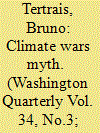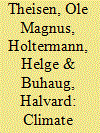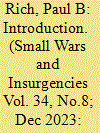| Srl | Item |
| 1 |
ID:
110147


|
|
|
| 2 |
ID:
108842


|
|
|
|
|
| Publication |
2011-12.
|
| Summary/Abstract |
Dominant climate models suggest that large parts of Africa will experience greater climatic variability and increasing rates of drought in coming decades. This could have severe societal consequences, because the economies and food supplies of most African countries depend on rain-fed agriculture. According to leading environmental security scholars, policymakers, and nongovernmental organizations, an increase in scarcity-driven armed conflicts should also be expected. A conditional theory of environmental conflict predicts that drought increases the risk of civil war primarily when it strikes vulnerable and politically marginalized populations in agrarian societies. However, an empirical evaluation of this general proposition through a unique gridded dataset of postcolonial Africa, which combines high-resolution meteorological data with georeferenced data on civil war onset and the local ethnopolitical context, shows little evidence of a drought-conflict connection. Instead, the local risk of civil war can be explained by sociopolitical and geographic factors: a politically marginalized population, high infant mortality, proximity to international borders, and high local population density.
|
|
|
|
|
|
|
|
|
|
|
|
|
|
|
|
| 3 |
ID:
192660


|
|
|
|
|
| Summary/Abstract |
This special issue contains five papers dealing with various aspects of climate change and its relationship to patterns of insurgency and terrorism. This is the first special issue in this journal on a topic that increasingly dominates the media and wider political discussion, though SWI has published some papers previously in this area, most notably one by Marina Malamud in 2018 that usefully categorised climate-change conflicts into four types: 1) those linked to the environment into resource-based conflict; 2) a warfare ecology paradigm referring to non-premeditated change to the environment as a result of military conflict; 3) warfare in which the environment was the target and 4) an insurgency-conflict intersection in which climate change increased the likelihood and frequency of war and conflict.Footnote1 These four categories have helped inform the approach taken in this introduction, especially the last relating to the probable impact of global climate change on insurgencies.
|
|
|
|
|
|
|
|
|
|
|
|
|
|
|
|